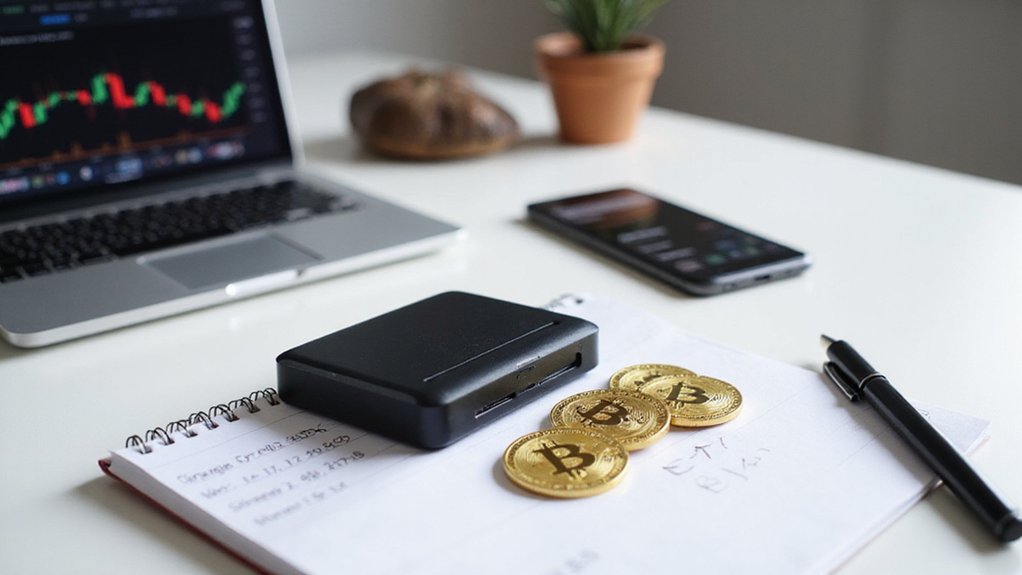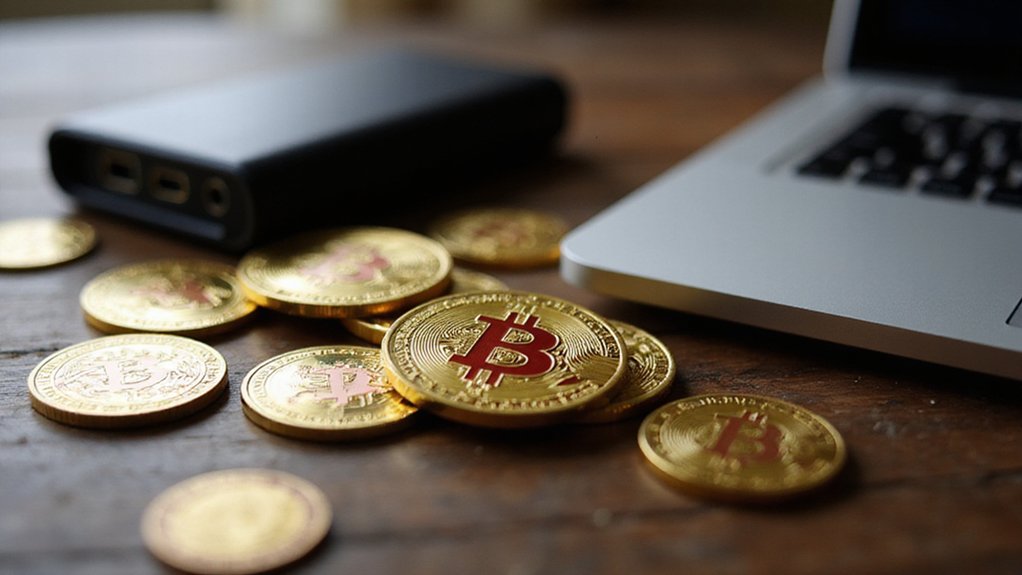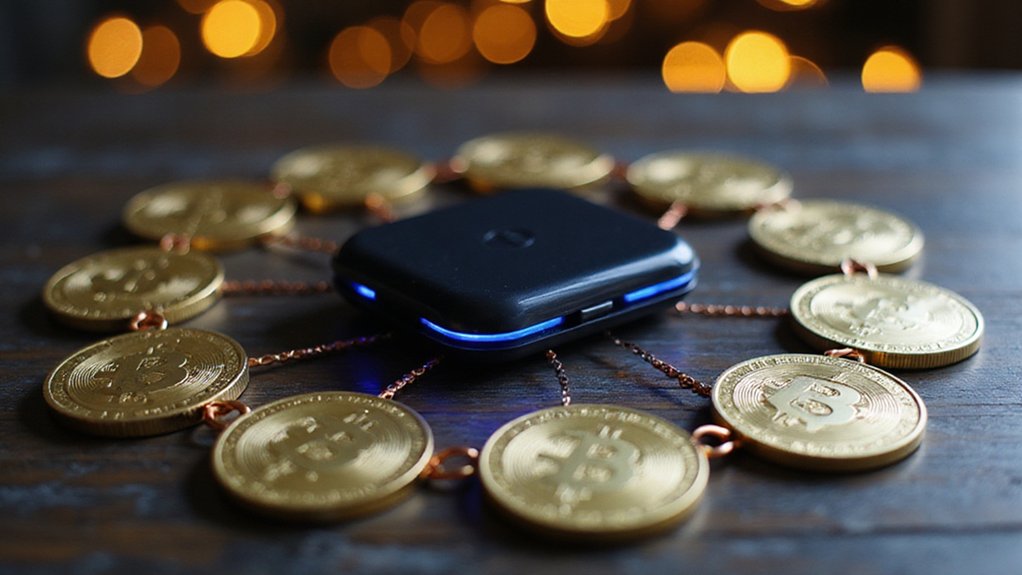Bitcoin newcomers must first establish accounts with reputable cryptocurrency exchanges—complete with the requisite identity verification procedures that somewhat ironically accompany this “decentralized” currency—before purchasing through bank transfers or credit cards. The prudent investor immediately transfers holdings to private hardware wallets (software variants offer convenience at security’s expense) while meticulously backing up seed phrases to avoid permanent loss. Mining remains feasible through pooled arrangements, though distinguishing legitimate cloud services from elaborate scams requires considerable due diligence in this volatile landscape.

While the notion of money conjured from mathematical equations might strike traditional financiers as particularly fanciful, Bitcoin has evolved from a cryptographic curiosity into a legitimate—if volatile—asset class that demands serious consideration. This decentralized digital currency operates without central authority oversight, relying instead on blockchain technology—a public ledger that records transactions with transparency that would make traditional banking uncomfortable.
Bitcoin’s creation through mining involves solving complex mathematical problems, a process that validates transactions while simultaneously adding new coins to circulation. The currency’s supply cap of 21 million coins introduces artificial scarcity (because nothing says “store of value” quite like predetermined digital shortage). Ownership relies on cryptographic keys stored in digital wallets, with transactions proving irreversible—a feature that eliminates chargebacks while ensuring costly mistakes remain permanent.
Acquiring Bitcoin requires selecting reputable cryptocurrency exchanges, which function as marketplaces for trading fiat currency or other cryptocurrencies. Most platforms mandate identity verification through KYC procedures, accepting payment methods ranging from bank transfers to credit cards. Investors can purchase Bitcoin through market orders for immediate execution at current prices or limit orders for specific target prices.
Post-purchase, transferring Bitcoin to private wallets becomes essential for security, particularly given exchanges’ unfortunate propensity for spectacular failures.
Wallet selection presents various options: hardware wallets offer superior security by maintaining offline storage, while software alternatives provide convenience at the expense of vulnerability. Beginners must backup seed phrases religiously—losing these recovery codes means permanent Bitcoin loss, a sobering reminder that decentralization transfers responsibility alongside control.
Mining operations range from solo endeavors requiring substantial hardware investments to pool mining arrangements that aggregate computing power. Cloud mining services offer participation without equipment ownership, though distinguishing legitimate providers from elaborate scams requires considerable due diligence. The network automatically adjusts mining difficulty based on the total computational power to ensure new blocks are added approximately every 10 minutes.
Bitcoin’s notorious volatility demands cautious investment approaches, while security considerations extend beyond price fluctuations. Two-factor authentication and robust passwords help mitigate exchange vulnerabilities, though phishing scams and fraudulent schemes persistently target newcomers. Beyond Bitcoin itself, blockchain technology has enabled the development of decentralized finance protocols that offer peer-to-peer transactions for lending, borrowing, and trading without traditional intermediaries.
Regulatory landscapes vary dramatically across jurisdictions, creating additional complexity for prospective users.
Common beginner mistakes include utilizing unreliable exchanges and inadequate security practices. Given Bitcoin’s unforgiving nature—where technical errors often prove financially catastrophic—thorough research and conservative approaches serve newcomers better than enthusiasm alone.
Frequently Asked Questions
Can I Lose All My Bitcoin if I Forget My Private Key?
Yes, forgetting one’s private key results in permanent, irreversible loss of all Bitcoin holdings—a peculiarly unforgiving feature that distinguishes cryptocurrency from traditional banking’s safety nets.
Unlike conventional accounts with password reset options, Bitcoin operates without central authorities or customer service departments. The private key serves as the sole gateway to funds, and its absence renders approximately $140 billion worth of Bitcoin perpetually inaccessible, transforming digital gold into digital ghosts.
Is Bitcoin Mining Still Profitable for Individual Miners in 2024?
Bitcoin mining profitability for individual miners in 2024 remains technically feasible yet increasingly challenging.
While the network generates approximately $20 million daily in rewards, individual success hinges on electricity costs, hardware efficiency, and market volatility.
Professional operations dominate through economies of scale, leaving smaller miners competing for modest returns.
The upcoming halving will further compress margins, making cheap electricity and efficient ASIC hardware virtually mandatory for sustainable profitability.
How Do Bitcoin Transaction Fees Get Calculated and Who Sets Them?
Bitcoin transaction fees emerge from pure market dynamics—users bid against each other for limited block space, with fees calculated by transaction size (measured in virtual bytes) multiplied by their chosen rate (satoshis per vByte).
No central authority sets these rates; instead, users select fees based on desired confirmation speed, while miners naturally prioritize higher-paying transactions.
Fee estimation algorithms help navigate this digital auction, though network congestion can render predictions laughably obsolete.
What Happens to Bitcoin When the Internet Goes Down Globally?
A global internet outage fundamentally freezes Bitcoin’s nervous system—transactions halt, miners cannot add blocks, and the network enters suspended animation.
While existing blockchain data survives locally, no new activity occurs until connectivity resumes.
Alternative methods like satellite broadcasts or mesh networks offer limited workarounds, but Bitcoin’s decentralized strength becomes its Achilles’ heel: global consensus requires global communication, making the network paradoxically vulnerable to worldwide connectivity failures.
Can Governments Ban Bitcoin and Make It Completely Illegal to Own?
Governments can certainly declare Bitcoin ownership illegal—China’s extensive ban demonstrates this reality.
However, complete enforcement remains practically impossible due to Bitcoin’s decentralized architecture and cryptographic foundations.
While regulatory frameworks can drive activity underground (creating black markets) and impose severe penalties, the network’s global, peer-to-peer nature means determined users can circumvent restrictions through VPNs, decentralized exchanges, and privacy tools, rendering absolute prohibition more theatrical than effective.









